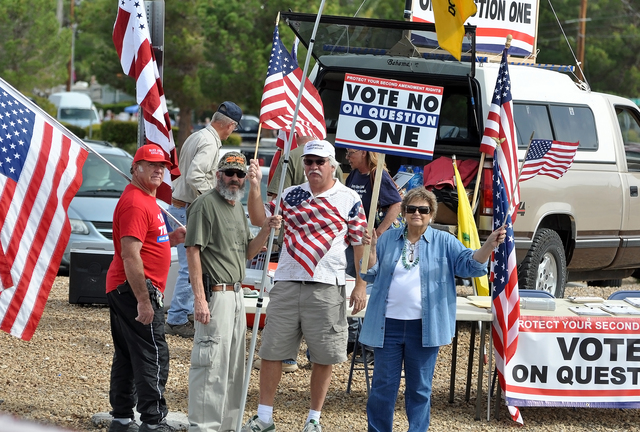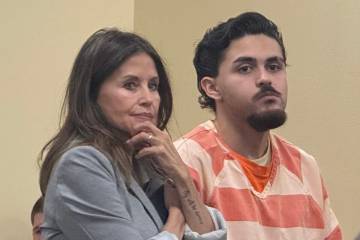Nevada’s new background check for guns halted before it begins
CARSON CITY — A new Nevada law requiring background checks for private party gun sales was deemed unenforceable Wednesday, days before it was to take effect because the FBI refuses to conduct them and the state lacks authority to do so.
The opinion issued by the office of Republican Attorney General Adam Laxalt left gun enthusiasts elated and proponents of background checks reeling from the blow of another setback — the second since 2013 when a bill requiring universal screenings was passed by the Legislature but vetoed by Gov. Brian Sandoval.
Backers are now turning their sights to the 2017 Legislature, while others expressed hope that the state and FBI can work out a compromise.
Senate Majority Leader Aaron Ford, D-Las Vegas, said the Senate “will consider legislative solutions this session to ensure that Nevada law is enforced.” The Legislature convenes Feb. 6.
Ballot Question 1, narrowly approved by voters in November, was set to take effect Sunday. It required background checks on private-party gun transfers, similar to sales made when someone buys a gun through a federally licensed dealer.
But unlike retail sales, the initiative states that dealers conducting background checks for private transfers must contact the FBI’s National Instant Criminal Background Check System to determine whether the buyer is eligible to purchase or possess firearms under state and federal law.
“The Background Check Act mandates that the FBI conduct all background checks for personal transfers,” Monica Moazez, spokeswoman for the attorney general’s office, said in a statement. “The FBI, on Dec. 14, informed the Department of Public Safety that it will not conduct these background checks.
“Accordingly, the official Attorney General Opinion concludes that without this central feature … the Background Check Act cannot commence.”
The opinion was requested by James Wright, Nevada Department of Public Safety director, who sought guidance after being informed by the FBI that it would not conduct background checks alone.
In its letter, the FBI said Nevada is a “point of contact” state that uses the federal NICS system and a state central repository — a database that includes such things as mental health records, domestic violence incidents, misdemeanor criminal records and arrests reports, as well as restraining orders.
“The state of Nevada can provide a more comprehensive NICS check that is accomplished when a (point of contact) accesses state-held databases that are not available to the FBI,” the letter said. “The Nevada DPS is also in a better position for understanding and applying state laws.”
It concluded that “the recent passage of the Nevada legislation regarding background checks for private sales cannot dictate how federal resources are applied.”
Opinions from the attorney general’s office are not legally binding and or set legal precedent. But coupled with the FBI’s stance it is a major setback for the gun background check effort that began in 2013, when Democrats controlled both chambers of the Nevada Legislature and passed a bill requiring universal background checks on all gun transfers. Sandoval, a Republican, vetoed the measure, saying it infringed on Nevadans’ Second Amendment rights.
Proponents, financed largely by Everytown for Gun Safety, a group formed by former New York City Mayor Michael Bloomberg, filed an initiative to take the issue directly to voters.
Question 1 failed in every Nevada county except Clark, which, with an overwhelming Democratic population base, pushed it to passage by nearly 10,000 votes.
Only 26.1 percent of Nye County voters supported the measure.
Laxalt’s opinion got some state Democrats fired up Wednesday.
“Background checks are the law in Nevada, and it is the Attorney General’s job to enforce Nevada law,” Ford said in a statement. “It is clear however, that he has succumbed to out-of-state special interests interested in thwarting the will of the people.”
Jennifer Crowe, spokeswoman for Nevada Moms Demand Action, and a part of the campaign to pass extended background checks, echoed the sentiment. She said the group is confident the state and the FBI will work together to implement the will of the people.
Crowe said several states have hybrid systems using both in-state and federal systems, and the Department of Public Safety can explore other options with the FBI.
Opposition to the new law was funded mainly from the National Rifle Association. Robert Uithoven, director of NRA Nevadans for Freedom and a close ally of Laxalt, hailed the opinion.
“This is what happens when you allow uninformed, out-of-state groups that prey on people’s emotions to write your laws,” Uithoven said in a statement.
A core argument from the opposition campaign was that the law was poorly written, and Don Turner, president of the Nevada Firearms Coalition, said the FBI letter proved that.
“Whoever put the ballot initiative together didn’t research very well,” Turner said. “It’s what we kept saying all along.”
Sandoval spokeswoman Mari St. Martin said the governor will review the opinion and discuss it with the department of public safety.
Justin Jones, a former state senator who carried the 2013 bill, suggested Laxalt’s opinion was politically motivated.
“A version of this law passed the Nevada Legislature, was later upheld by a state court and then made law by a majority of Nevadans,” he said in an email. “Attorney General Laxalt’s job is to enforce the laws, not to seek out ways to avoid enforcing laws he doesn’t agree with to advance his conservative political agenda.”
Contact Sandra Chereb at schereb@reviewjournal.com. Follow @SandraChereb on Twitter. Contact Wesley Juhl at wjuhl@reviewjournal.com. Follow @WesJuhl on Twitter.
















